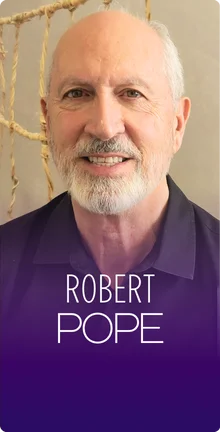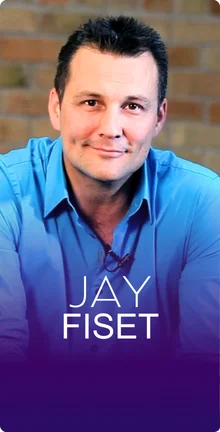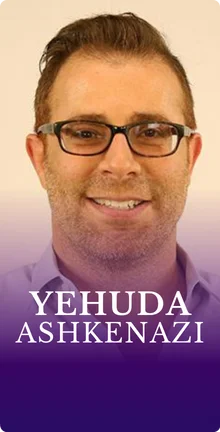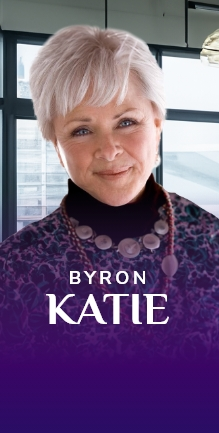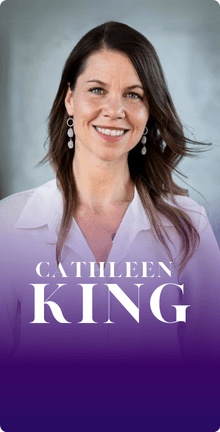In this Episode
- [03:09]Pamela started creating models to explain business growth, and shares one thing that cuts across all levels of business.
- [05:15]What are the most common mindset blocks or limitations that Pamela comes across? In her answer, she talks about the four limiting stories that all of us have in some combination.
- [09:17]Pamela discusses a coping mechanism that she had in response to feeling that she wasn’t lovable.
- [10:27]Stephan’s limiting story is the “not good enough” story, he explains, and digs into how this has been the case for him.
- [12:34]What does Pamela think Stephan’s coping mechanism would be in his situation? She turns the question around, encouraging him to explore the answer to this himself.
- [17:02]Pamela moves into discussing what you should do about your limiting stories and the resulting coping mechanisms once you recognize them.
- [20:25]What Pamela has been saying reminds Stephan of one of Byron Katie’s four questions, which is, “what would life be like if this thought didn’t exist?”
- [22:10]Pamela uses her business as an example of moving beyond one’s limiting story and the resulting coping mechanisms. Stephan then connects Pamela’s strategy to a Kabbalah concept.
- [25:27]Another coping mechanism that Pamela sees is hard work. She then points out that whatever comes up when you’re tired or low on resources is probably part of your coping strategy.
- [27:48]Pamela shares a way to have a conversation with the critical little voice inside and transform it into something more useful.
- [30:54]Stephan heard a similar analogy a few weeks ago at the Bulletproof Conference.
- [33:42]We learn that Stephan is also a fan of EFT through a story he shares about his experiences in being able to do things that he had previously been terrified of.
- [36:13]How did Pamela end up getting a book deal with Jack Canfield?
- [39:11]Pamela discusses the fact that she did most of the writing on the book she co-wrote with Jack Canfield, and reveals that she enjoyed collaborating with him.
- [39:55]Pamela talks about her journey from $375 a month to a million dollars in less than three years.
- [42:57]We hear about Pamela’s experience with joint venture partners.
- [43:55]How often does Pamela tap, and is she doing her own tapping or working with a coach?
- [44:57]Pamela has a short video series called Tapping to Double Your Income.
- [45:53]Are there any other contributors to success that Pamela wants to share with listeners?
- [48:22]Stephan offers Pamela the opportunity to list any specific tools that she has found to be helpful.
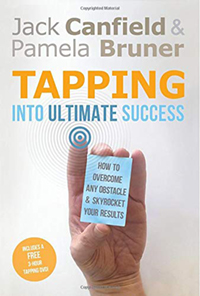
Pamela, welcome to the show!
Thank you, Stephan. It’s such a pleasure to be here.
It’s a pleasure to have you. We keep bumping into each other at JVX events, and saw you at War Room, which is digital marketers and masterminds, and how is that going, by the way? I haven’t been going to the meetings. Last time I saw you was it in January or March? I think it was March at Traffic and Conversion Summit, right?
Yeah. I love geeking out on all the digital marketer stuff. I’m a person who really enjoys working deeply in my left brain and my right brain. Sometimes it feels a little schizophrenic but it’s really fun to bounce back and forth between them onset and the very geeky bit fiddling as I call it.
Yeah. You’re going to renew for another year? Are you continuing with the program with War Room?
Yeah. It’s my intention both from the connections that I get there and also from the great ideas. I find that they’ve got interesting ideas that benefit me as a CEO but then they’ve also got the here is a great internet marketing hack that we tried that you could try to attract new clients. That’s a lot of fun.
Yeah. I’ve had multiple guests from my other show, from Marketing Speak. I’ve had Roland Frasier, from DigitalMarketer, some other folks from DigitalMarketer, had Molly on. And also some other War Room members, like Sayed Belki, you might know him?
Very smart man, you bet.
He is, he is. You are an author, a speaker, a business coach and you have really transformed your business so you eat your own dog food, so they say. It’s like you take stuff that you learned and you apply it in your business, you grow your business and then you teach it to others so that they can grow theirs. Let’s talk a bit about that.
Yeah. I’m really excited about it. I started trying to create models to explain the various growth phases that business owners had to go through, and I know that there are many different models out there for business growth, but when I looked at them in all of the different areas that entrepreneurs need to do well, they need to make great decisions, they need to be able to lead people and teams, they need to be able to plan projects and tasks and get things done. The one thing that cut across all levels of entrepreneurs, all levels of business owner, whether you’re somebody brand new who has an idea and has yet to make your first dollar or whether you’re in a million-dollar or multimillion-dollar company, the one thing that cut across everything was the mindset. That mindset will slow you down, stop you and derail you no matter what level your business is and it doesn’t seem to matter what you’ve done, there is always some new mindset challenge out there.

Yeah. In fact, a lot of people have this what Tony Robbins refers to as thermostat for their maximum amount of money that they’re able to make. Maybe they can’t break into seven figures, they just have this mental block against it. Kind of like the four-minute mile, when somebody breaks it, now everybody is breaking it. But this is an internal thermostat. I can’t seem to break this particular threshold and it just keeps you down but it’s all in your head.
I found that actually in two different ways. One is a thermostat, I love that image, thermostat limit on what you can charge, there are maybe particular maximum charge for a particular client or for one client or for one offering, or you may be fine charging $10,000, $25,000, $50,000 per client but then you’ve got a ceiling on top of the revenue. We have to look at both of those because either one of those will hold you back.
What do you find to be the most common blocks or mindsets issues that you come across?
So glad you asked. One of the ways that I like to teach this is I talk about the story that runs your life. Basically, there are four stories and all of us have them in some combination and we usually have one that predominates. As I go through these stories, I want to invite you to sink into this and say if this were true for me, how would this be affecting me? The first story is a story of helplessness. Usually, the way that this shows up is it shows up in people who have had some level of success in that they dislike people who abuse power. It might seem obvious, we’re all going to dislike people who abuse power but when it feels very triggering to you and you tend to react in a way that maybe just proportionate to the situation, you’ve probably got a little bit of the helpless trigger. Another trigger that shows up a lot for entrepreneurs is not good enough. It’s not just not good enough, it could be not blank enough, I’m not smart enough, I’m not thin enough, I’m not pretty enough, I’m not whatever but it’s all lumped out into the ‘I’m not good enough.’
Did you say that Impostor Syndrome fits into that one?
Very much, yes. People with Impostor Syndrome, not good enough. You may already know, it’s probably the best identified of the stories, you may already know if this is a challenge for you but it will show up in often envy or jealousy of people who get accolades. Even if you want to feel like really I ought to use that as an example of what’s possible and I admire their success and things like that, if there is that little twinge inside that’s like why are they recognized and I’m not? It may very well be from not good enough. The third one that we want to look at is not loveable. This is my personal favorite, this is the one that goes back for me. It was very hard for me, I actually had to do some mental exercises to actually get my head around the fact that people like me and that I didn’t just need to be useful to them or valuable to them. The way that I did it was to ask myself the question, “What is it that I like in other people?” As I started listing the qualities that I liked in other people, I started chuckling and said, “Wow, I actually have those qualities. Maybe it’s possible that people like me for the same reasons.” That story was so deeply ingrained that I had to go through these machinations in order to say, “Wow, I think I’m actually likable or loveable.”
If you don’t have boundaries, it’s very hard to scale your business.
Until I did that, one of the ways that showed up for me was not drawing boundary lines with clients because I was afraid if I wasn’t a pushover they wouldn’t like me, because that was a deep-seated fear of mine. Setting those boundaries enabled me to scale my business more because of course if you don’t have boundaries, it’s very hard to scale your business. And then the final one is feeling unsafe. We see this a lot in the coaching industry and a lot of my clients are coaches and healers. Unsafe will often show up in just feeling like you can’t take risks, which of course is detrimental to being an entrepreneur. As we look at those four categories and there are stories that are a little bit hard to admit to, it takes a level of self-awareness. Here is the interesting thing about creating success as an entrepreneur. Usually, if you got one of these stories and you are functional and to some extent successful, you will have created a coping mechanism to help you get over these stories, how interesting is that? As you create that coping mechanism, the problem with that coping mechanism is it will usually take you to the first level of success and then stop you there. It is a crutch that got you there but it won’t get you to the next level. The challenge with getting past that is you have to dismantle that coping mechanism in order to reach to the next level but dismantling it feels very, very unsafe.
What would be a coping mechanism that you had in regards to not lovable?
Making myself very useful and valuable to people that I would bend over backward to make myself useful and valuable. I would always go the extra mile. People-pleasing is one way to do it but another way is just to establish either your business or your offering or something like that and say how can I be of great service to you, how can I be of great use to you? The thing about that is, I call it a coping mechanism because it looks on the surface like it would be something that you should do in business anyway. We always want to ask the question how can I be of service to you and how can I be valuable to you or how can my business be valuable to you? The thing is, and this is where it gets a little hard to define, we need to look at the energy that’s behind it because you can come from an energy behind it that’s truly of service or you can come from the energy behind it of I need to show you I’m valuable so you will like me. The second one, the latter one, that’s where you’re not actually coming from a place of service, interestingly enough, you’re coming from a place of selfishness. And I certainly was before I figured this out.
Wow, what an insight. I think I’m in the not good enough bucket, I’m working on it. I would say that I have a bit of Impostor Syndrome and in fact, I wrote a Huffington Post Article about it and I discovered the distinction of something called Comparative Success Syndrome. You wish you could have done something differently that you would have been more useful to humanity on some different path you chose not to take because you went after the money or you went after the fame or whatever. I was studying for a Ph.D. in Biochemistry and I abandoned that two years in, I stopped with a Master’s Degree and didn’t further that study at all and I started an agency. I felt like I could have really done something for humanity, cure cancer, or something and I just gave it all up so that I could chase after the almighty dollar.
Now there were other reasons I had, all this technical acumen from many years back, I taught myself computer programming when I was a little kid. Not just basic but also assembling language and stuff, I was a real geek. There are plenty of good reasons for me to have pursued this different path of, which I did end up pursuing by dropping out of the Ph.D. program and starting an agency, becoming an internet marketer, and getting in SEO and all that. But I felt like I gave something up that was really important to humanity, maybe not as important to me but like I could have made a real difference in the world. I’m making a difference now, I make a difference in the podcast and so forth but that Comparative Success Syndrome aka Impostor Syndrome does creep up on you and it is kind of insidious. It doesn’t really seem to affect your life until you have this greater insight and awareness and then I was like, “Wow, I made some different decisions in my life because of that.” What do you think my coping mechanism would be in such a situation like this?
One of the coping mechanisms that we do is to establish ourselves as that authority in a particular area.
First, I really acknowledge you for how quickly you found your place in this model that I described. Here’s the thing, you’ve identified the problem and guessing the coping mechanism. One of the coping mechanisms that we do is to establish ourselves as that authority in a particular area. If you got somebody not good enough, it’s to say what am I really, really, really good at? And if you go into an agency model, or you go into internet marketing and you make money, that’s a strong hedge against the Impostor Syndrome or at least externally, it looks like a strong hedge. That’s one of the things. Also, with the not good enough, I’m guessing you’ve never had the not smart enough. You’re programming at a young age, not good enough doesn’t mean not smart enough for you, right?
That’s right. I always knew I was a genius.
Right. You’re just looking for another way to live into not good enough and you found it in yes, I’m smart but I am not being of service. I’ll turn this around to you and this is a very vulnerable question to ask you.
I’m game. I’ve done all sorts of crazy stuff. Byron Katie did the four questions and the turnaround, did The Work on me with a very vulnerable issue and I did it completely impromptu. I’m happy to be a guinea pig. It made for a very powerful episode. I’m game. I talked about Impostor Syndrome and my relationship to it and the episode where I interviewed Alyssa Fisher Harrison. She’s the one who told me about Comparative Success Syndrome, I had no idea that even existed. I’m game.
Okay, great. I’ll turn it back around to you and say what is something that you’ve done that you’ve used to prove that you’re good enough?
I guess the first edition of The Art of SEO had some of that component and then I suppose I didn’t feel like I was being recognized as much as I could have been or should have been as a leader in the industry. Once I had that book out, that really shifted things. To some extent, I guess even my second book which was Google Power Search. I made sure that book I was a solo author of, because I want to be a solo author and not just a co-author.
Brilliant. It doesn’t mean that those weren’t good choices for you but reminds me how many pages are in The Art of SEO?
Nine-hundred and ninety-four, almost a thousand pages. Now the first edition wasn’t nearly that thick. It keeps growing.
SEO is a complex enough subject that it weren’t a thousand pages and if we’re looking at an example that might be a bit of a coping mechanism, that’s a lot of pages of the book.
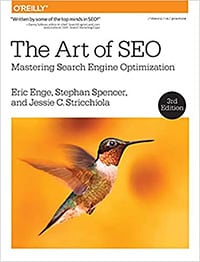
It’s kind of overwhelming, yes. It has a big thump factor when you drop it on a table. And it also makes it a little daunting for somebody who’s not super technical to want to get into that book. If it were half the size, it would get more sales, it would get read more but it wouldn’t be as comprehensive and I’m kind of a stickler about that. The publisher really pushes back and says we need to cut the size of the book. I’m like, yeah, that’s going to make for not a very good book. It’s going to be okay but it will have cut in different aspects, it’s not just going to be a definitive book anymore on SEO.
Right. Wouldn’t be good enough.
Yeah, it wouldn’t be good enough.
Anyway, interesting example. Just with the size of the book that you’ve put out before. I totally get your reasons, the thing is, what we know from brain science is that we are masters of rationalization. Anything that we need to explain, as I’m sure you know from talking to wonderful people like Byron Katie, anything that we need to explain we can always find a rationalization for. I just really appreciate the fact that you can see the possibilities for it. Should we move into great, if you recognize this, what do you do about it? Would that be a useful conversation to have?
Yeah. By all means.
Because we don’t want to sit in this. Here’s the thing, first thing to do is to at least conjecture as you have done about what your story is. Even if you aren’t sure, you can take all four of them on one at a time as possibilities. And then, ask the question as you did. If there were a coping mechanism that I had instituted. For example in my case, what I might be doing to make myself more loveable that perhaps is not in my best interest or interestingly enough in the best interest of my clients or my family or my friends, the people I want to serve, my tribe. What might I be doing that is more in service of overcoming this story than of actually creating the change that I want to create in the world? And once you started looking at things through that lens, I think it’s much easier to see them.
Yeah. Doing another edition of The Art of SEO I don’t think is going to move my career and my business that much more forward. I’ve got three editions now. Yeah, it’ll be nice to have a new edition but what I think would move things forward in terms of helping more people and having a greater impact on the world would be to get my self-help books out the door. I’ve got one called Geek Revolution and I got one called Get Yourself Optimized, both are in various stages of being done, Geek Revolution is nearly done and that’s a big departure from all my technical books. I got three O’Reilly published books on internet marketing related and internet-related topics. Now, it’s going to the self-help area, it would be of much more importance and more in my gift next step. I identify as a healer and not just a geek who is really good at online marketing, I got a bigger role to fill in this world. I know that that’s not like Impostor Syndrome, that’s me knowing that I need to play bigger.
I love the idea that you’ve got these books that are contributing in a different way. Now we go back to this whole idea of leaving Biochemistry and saying what if I’d stayed, would I have served the world in a big way. Not that you don’t serve the world through internet marketing, but the self-help aspect, I think is another way to serve the world. The cool thing about taking a look at what’s the next step or what would I do if I weren’t worried about overcoming the story of not good enough, then whatever you come up will be the next step for you. It is also a coping mechanism. It’s going to be great for a few years, and if you’re willing to take it on at some point in the future, and it’s not something you can consider now, you really can’t jump levels, you only advance one level at a time. But at some point, whatever you’re doing will be the next coping mechanism and then you’ll want to just mail that to climb even higher in levels of service.
I get that. This reminds me of question number four of Katie’s four questions which is what would life be like if this thought didn’t exist. If that constraint, if that belief, that limiting belief didn’t exist, what would be possible in your life, in the business, in your career, in your relationships and usually it’s a lot more, it’s not less.
Right, exactly. Sounds like it’s great to go back and forth from the internet marketing into the self-help and it’s wonderful that you have the facility to do that.
I have already made that foray with my podcast, with this podcast. It’s a way that I have started to create this movement and I specifically named this podcast the same as the upcoming book because I wanted the community to have something to rally around. When I come out with the book, we have all these episodes of this podcast that have hopefully made a big difference in their lives.
Yeah, great.
You identify whether this is in my best interest or not and how it’s not in my best interest that will identify that it’s a coping mechanism and that you can find something better that does align with your best interest and your family’s and your own business. The stuff that doesn’t work for you might be a coping mechanism and that doesn’t actually help move your life forward, you can shut all that.
If there is something for us to let go, it will not only benefit us, it will benefit by extension our family, our communities, our tribes.
Yup. I’ll give you an example for my business that I started talking about a few minutes ago, this idea of boundaries. If I look at my story is I’m not loveable, I look at the possible coping mechanisms that I might have put in place, wow, I am overly accessible and have no boundaries with my clients. Is it possible that turning that around is not only more in service of my own needs, which I think it is, but what if it’s more in service of my tribe? What if it’s more in service of the world? In fact that turned out to be true, because as I set boundaries, I was able to scale my business, I was able to serve more people and I was able to serve them more professionally. It wasn’t just oh, Pamela gets to have a little more self-care, it was this is a necessary step in order to create a business that’s actually going to make more of a difference in the world. I find that that is always true, I don’t think there’s ever a time when something that serves us better is going to serve the world less, I think it’s always a win-win. As we look at these coping mechanisms, I’m not good enough, the helpless, the I’m unsafe something like that, if there is something for us to let go, it will not only benefit us, it will benefit by extension our family, our communities, our tribes.
Yeah. In some cases, in many cases, I bet it would also help the people that you think that you’re benefiting with that coping mechanism. For example, the clients that you were giving them over access to you and they weren’t respecting your boundaries because you weren’t making them very visible, you were giving them what in Kabbalistic terms or in Kabbalah refers to this as the bread of shame. When you give your 16-year-old kid a brand new Ferrari because they turned 16, they didn’t earn it. You create this thing called the bread of shame which basically is this problem that they have to overcome now because they believe that this is how life works. When you get stuff for free without putting in the effort, it comes with side effects. Let’s say you won the lottery, you’ll end up blowing it or having some sort of tragedy happen or something not go your way because it comes with side effects, you didn’t earn it. I think making it very clear to your clients that hey, I’m not available on weekends, or [2:00]AM, or responding to your emails or whatever is not only good business for you but it’s good business and good karma all around.
It’s also a great example to them because since I work with so many coaches and healers, my setting boundaries give them permission to set boundaries with their clients. There were all kinds of things wrong with this coping mechanism that might have looked like I was just being a nice person and it was really creating a lot of trouble, and that’s just one example of a coping mechanism but there are so many that I see. Another one that I see that sometimes shows up with the Impostor Syndrome and not good enough people is hard work and it can show up with the not good enough, it can show up with the unlovable, is let me just work very, very, very hard because that’s a way of either proving my worth or making myself lovable to you.
It’s not a badge of honor, honestly. People saying yeah, I’m just out there hustling and pounding the pavement and working 18 hour days. Everybody answers when you ask them like how are things, busy, as if that’s a good thing. You could be just working your tail off and not actually making a difference in your life or in the lives of others.
Yeah, exactly. The funny thing is one of the ways that I know, I love to work hard, probably because I love what I do but partly because that’s one of the things that I’ve worked to shed as an identity. I always want to work harder when I am more poorly resourced. If I’m tired, I always think I ought to be working harder or if I’ve been struggling with a mindset issue, I’ll go I just need to work harder. It’s funny that the ‘I need to work harder’ always goes with me not being well resourced and at the top of my game. I can tell it’s a coping mechanism because it comes up during times when I’m not playing full deck.
Wow. What a great insight. That was very aware of you to figure that out.
Whatever comes up for you, it’s funny when we are lower resourced, that’s usually when the critical little voice in our head actually starts talking. It’s like when you’re feeling powerful, that voice may be quiet, but when you’re feeling really tired or when you’ve had five sales calls in a row, which all resulted in a no or you lost a big client or something like that, that’s when the little voice speaks up. It’s a great indicator that that little voice isn’t perhaps as accurate as it might be. It’s like the voice that comes up if you’ve had too much to drink. It’s like, don’t listen to that voice, that’s not a good one to listen to, not giving you good advice.
When we are lower resourced, that’s usually when the critical little voice in our head actually starts talking. Share on XYeah, yeah. Inner critic or inner negative voice.
Right. Hey, could I share a final way to wrap this up that I think might be useful? A way that I think you could have a conversation with that little voice and transform it into something that might be more useful?
Yeah. Perfect.
Okay, great. Because my main modality is tapping, what a lot of people call EFT, I will often do this as an EFT routine. If you know tapping and want to tap along as you do this, that’s great. If you don’t know tapping, there’s no need to worry about it, it can also be done as little bit of a visualization exercise. But whenever you hear that little voice, and sometimes we can trigger it just by thinking about something that we know the little voice would have objection to like you know what, I’m going to go out and find 5 new joint venture partners or I’m going to go reach out to 10 new potential referral partners or something like that. The little voice pipes up and goes, no, that will be a very bad idea. They’ll reject you or it won’t go well, or something like that. As soon as you hear that voice, one of my favorite questions to ask is, “Why are you telling me this?” And I will continue to ask that question no matter what it says. “Because it’s a stupid idea!” “Great, I understand this is a stupid idea and why are you telling me this?” “Because you’re going to get crushed in this.” “Great, I understand that I’ll get crushed, and why are you telling me this?” And finally, the voice will usually get to a point where it says, “Because I don’t want you to be hurt.” Or, “Because I don’t want you to fail.” That’s the phrase or the key that I’m looking for and I will jump on that and say, “So, is it true, you don’t want me to fail? Is it true that you’re actually looking out for my self-interest?”
It’s so funny because as I have conversations with these little voices, and I’ve had many, many of them, the little voice will usually grudgingly admit, “Yeah, right. I don’t want you to fail. Ugh!” It feels almost like we have to coerce into admitting that he actually cares about us. Once you get that admission from that little voice, no matter how many back and forth it takes, you now know that you’re actually working for the same objective, and now you can pull out all your managerial skills or coaching skills or whatever enrolment skills, sales skills you have because now you know that you’re working with an employee who cannot be fired but can be retrained. If you look at the little voice that way, you can get a very powerful cheerleader on your side. Then the conversation is great. You’ve been working for the same objective that I have been. Now let’s talk about a way to amp up your skills, now let’s talk about giving you new resources so you can do your job even better. I’ll pull in anything from a spiritual concept like, “Hey, could you create a golden bubble of protection around me as I go on these sales calls so I don’t feel any of the rejection?” If I’m in a spiritual frame of mind and talking to a spiritual part of me, that suggestion works great, otherwise, I might say, “Hey, could you be my director of opportunity and instead of looking for ways in which I might fail, will you sit in my subconscious and look for ways that I might succeed? Great, you can do that.” I call it retraining the corporate culture in your head.
Wow, I love that. I actually, for the first time, heard a similar analogy just like two weeks ago. I was at the Bulletproof Conference. Dave Asprey is the guy who puts that on and Kristen Ulmer was one of the speakers. She’s talking about fear, she has a new book on fear and what she was describing as fear is essentially an employee, out of tens of thousands of employees working for you that are part of your consciousness, your sphere, there is your inner critic, all these different employees. When you ask that employee to chime in and give you its position on things and its suggestion and so forth then it feels heard and it’s not acting out. It’s similar sort of thing to what you’re describing, tapping into your inner critic as an employee in the corporation of your consciousness and making sure that you guys are both on the same page, it’s really cool.
Yeah. I love that metaphor and I’m not surprised, I’m sure there are many more people who are using that particular metaphor of corporate culture in your head or employees to be retrained. The cool thing is, once I started doing this, I started doing it almost every day with some voice that came up and I’d retrained voice after voice, fear after fear, and somewhere around the 30th or the 50th or something like that time that I did that, I identified a particular fear and I will do this as a visualization sometime. I’ll actually visualize that the voice I’m talking to has a face and sometimes it looks like a cartoon character or a child or fuzzy pink basketball or something like that, but I’ll be visualizing talking to this part and when I said, “So tell me why you’re saying that and let’s have a conversation.” The part showed up and said, “Okay boss, I’m ready to be retrained. What do you want me to do?” And I was like, “Wow. The message has gotten through to the corporate culture that I’m not trying to squelch you, I’m not trying to fire you, I’m just trying to retrain everyone and give them good tools.” Things got easier after that. I can’t pretend to know exactly how the subconscious works, I don’t know if anybody does but it was a really interesting occasion.
Yeah. That’s great. To think of it in the same way, as far as not trying to squelch the employee insight of your corporation in your head, in terms of fear as well, this idea of conquering fear, means that you’re pushing it down and you’re telling, “I don’t value you, I don’t see you contributing to my well being, let’s just conquer you.” I got to have Kristen on the show, pretty sure I’ll have her on in the next couple of months, Kristen Ulmer. It’s really, really cool. I love that analogy. I’m also a big fan of EFT, of tapping, and in recent years got exposure to that, I was in Zambia. This was in 2011 and I got my first taste of tapping, it was from Fred Gallo who’s a well-known expert in the space and also a guest on the show here, Episode 53.
Fantastic episode, I have to say, where we talked about that trip to Zambia, South Africa, and Botswana, it was a Tony Robbins Platinum Partner Trip, and Fred had been invited by Tony to work with his platinum partners to help them get over fear of Shark Diving, which was what we did, as well as micro gliding, which is a hand glider with a motor attached to it. I was both scared of heights and of water, those both terrified me and I did them both. I’m so glad I did and the tapping was the reason I was able to accomplish both of those. Then it stuck, that’s the great thing too, months later, I was able to go inner tubing for the first time in my life, being pulled by a speed boat, never did that before. Then two years later, I went jet skiing for the first time in my life too. I was on the jet ski by myself. Pretty cool.
People ascribe magic to tapping.
Super effective for you.
Very, very effective.
I found it to be a tremendous modality. People ascribe magic to tapping. I actually think the magic is in the art of delivery which means it’s different for every person who does tapping although there is certainly various protocols. The book that I co-authored with Jack Canfield, Tapping Into Ultimate Success which is the combination of using EFT tapping for his book, The Success Principles, his New York Times Best Selling Book. We went into that, I just had created a lot of different protocols for using EFT tapping to help the subconscious mind and the emotions embrace the reframes that we hear all the time. We hear things like, “Don’t worry about being rejected when you go out and make sales conversations.” That’s really nice to say but how do you actually get yourself to emotionally embrace that concept. I think tapping is very, very good for that. That’s what a lot of the protocols and Tapping Into Ultimate Success do.
Awesome. How did that book come about? Jack Canfield is kind of a big deal. How do you end up getting a book deal with him?
Oh, thank you for asking. I love telling the story, it’s really fun. I was at his event Breakthrough To Success, a seven-day event. I had just gotten the very first demo copy of my first book called EFT and Beyond: Cutting Edge Techniques for Personal Transformation. It’s about a 500-page book. On our break, I showed it to Jack and he was admiring it. “Oh, this actually looks a lot like The Success Principles.” Later during the course of the workshop, he said, “On the next break, make a big ask of someone,” and I was not alone in trampling down people to get on the stage and make a line up to make a big ask of Jack. I said, “Jack, I want to write a book with you on EFT for The Success Principles.” He said, “The book’s already been started but the project is stalled, here’s my private email address, and let’s talk about it.” I wrote him and he sent me the initial work that have been done by a couple of different people on the book and I looked at it, and I made my second bold move which was to say, “I don’t love what’s been done. I think we can write a more powerful book and here is a proposal and here’s a sample chapter.” I never written a book proposal before, fortunately, I didn’t need to, I just needed to outline my ideas for Jack and he looks at what I said and said, “Yeah, this looks good.” So we wrote Tapping Into Ultimate Success together which ended up being a Hay House book.
Oh, amazing. I love Hay House. Just a great, great publisher. That’s really sad that Louise Hay passed recently. She was a real gift to humanity.
Yeah. She left quite a wonderful legacy.
Yeah, she did. Great story, I love your story about how you made a big ask and you got it. You have to put yourself out there and be willing to be vulnerable and take risks, and you did that. You made it. Big success out of it, that’s great.
Yeah, thanks. It was also one of my biggest launches. Certainly, my biggest launch to that time because when we talked about launching the book, Jack said, “Let me get in touch with people and see if they’ll promote the book.” And I said, “Jack, you need another New York Times Bestseller like you need a hole in the head, you got plenty of them already. Why don’t we do a product launch instead and downsell the book on the back end?” We created a product, it’s Tapping Into Ultimate Success, and a half a million-dollar launch of the product which would not have happened if we just started with the book sale. I was pretty stoked about creating a relatively successful launch on the front end of the book launch.
That’s great. You have a DVD program that is the bigger ticket item and then the book comes for free essentially as part of that.
Right, exactly. It enabled me to flesh out some longer-term processes and things like that that didn’t end up in the book but ended up in the DVD product. It was fun to do both and see how they fit together.
Did Jack do much of the writing or content development or was that pretty much all on you?
That was all on me and it’s a bargain I’d make any day of the week. I had these ideas to propose to him and I’m a decent writer so I would write things and send them to him. I remember the first time I sent him a chapter and he sent back with very little red ink, “This is really good.” I’m like, “Are you surprised? Yeah, I’m glad you think it’s good.” He said, “I don’t actually have to edit it very much.” I was like, “Yeah, that’s the idea.” It’s really, really fun to collaborate with him on that.

Awesome. I love that story and I would love to hear your story of what was the linchpin or the big secret to going from $375 a month to a million dollars in less than three years.
The first thing I’ll say is that it didn’t take the launch with Jack to do that, because I hit seven figures before the launch with Jack. People always think that oh, you partnered with Jack Canfield, that must have been what propelled you. But no, actually it was important to me that I hit the seven-figure mark before we did that launch. The number one thing was continuous tapping so that I could take risks. The turning point for me that I put out a book called The EFT and Beyond: Cutting Edge Techniques for Personal Transformation and because I put it out as a collaborative effort, we had 27 of the 29 EFT masters worldwide contribute to it. Then I did a book launch with all of them and so I got a lot of people who trusted me in the space. That’s six months after that book was released, I said, “Hey, I want to do a program launch.” This was my second year in business. I want to do a program launch on an EFT for business, sort of a tapping for the business program and get these people to JV with me and post me on teleclasses. I wasn’t very good at it then, I was just learning. I did the same teleclasses, it was even before webinars, I did the same teleclass 16 times. In doing that, each time with a different host, in doing that, I got much better at it but at the end of 16 teleclasses, I had a list of about 3000 people who had opted in to hear it and I had 12 sales. I was really, really crushed. It was six days before the program was due to start, this was several years ago, and a friend of mine said, “Hey, there’s this guy who’s doing a video on the internet.” This was in the days of flip cams and stuff. “Do you think you could do something like that?” With six days to go, I took a look at some stuff and I said, “I think I can.” I produced 4 10-minute videos with flip cams. I sent 1 a day to those 3000 people on the list and on the 5th day, I said, “Okay guys, you now know enough about me. The program starts tomorrow, you’re in or you’re out.” And in 24 hours, I had 92 people in the program.
Oh, yay!
Yay! That was a $45,000 launch, my very first launch but it was because with 6 days left I didn’t give up. That was the mindset thing, it was like, alright are you going to play full out and keep going and maybe risk embracing yourself by putting these videos out, but it worked.
Wow. Even it hadn’t worked, I’m sure you would’ve picked yourself up and dusted yourself off and you would have done another launch and you would’ve figured it out on the next one if you hadn’t figured it out on that one.
Yes, because certainly, all my launches since then have not been successful. Some of them have been wildly successful and some of them have not and that’s pretty much the way business goes. You have to be able to pick yourself up.
Yeah. To have a successful launch, you don’t need a business partner or a JV promotion partner, like you did with this $45,000 launch, with that first one. You didn’t rely on a JV partner, did you?
Those 16 teleclasses that I did were all promoted by JV partners, and since then I’m now a big proponent of paid traffic. I think that the industry has changed a lot since I’ve done that, JVs are still possible, paid traffic is still possible. Other things that you need to wrap your mindset around is I’m a person who loves comfort, honestly. I really want to do something until I get good at it and I’m familiar with it, I want to keep doing it forever, and that is just not the way to succeed. Learning to embrace change and learning to say, “Okay, I’m going to try this. This is new and I’ll probably mess it up,” is actually a pretty darn good way to succeed but for me, it requires a lot of tapping.
How often do you tap and do you go to somebody who works with you like another tapping person, I don’t know if you refer to them as a therapist, or her as a therapist or coach or whatever but are you just doing this for yourself?
Yes and yes. I tap pretty much every single day. It might be 2 minutes, it might be 20 minutes. But I have a tapping coach that I work with regularly, because there are some issues that it just helps to have an objective observer and someone reflecting things back. If it’s a particularly thorny issue, I’d rather get help on it. But in terms of daily tapping and daily calming myself down, removing barriers and things like that, I don’t think that tapping necessarily is the end all be all, I don’t know that it matters what modality you use but I think that you need a modality.
Yeah. I’ve gotten recently exposed to EMDR, Eye Movement Desensitization and Reprocessing, that seems pretty cool as well. There are lots of different modalities but you need to do something. If it’s affirmations, if it’s tapping or whatever, you can’t just do nothing and sit in your comfort zone because you’re not going to grow and you’re not going to make a big impact on this planet.
Yes, absolutely. One of the things that I wanted to share is whether people have experienced tapping or not, I do have a short video series called Tapping to Double Your Income. It’s free, it takes an opt-in but you can sign up for it, you can experience tapping, or you can experience tapping to remove some of the blocks that you might have to charge more, to earning more. If that’s useful for people, I want to just say, you can go to doubleyourincomeseries.com and take a look at those videos and maybe try some tapping to shift things for you especially in the financial or the business finance area.
That’s awesome and wonderful gift. Thank you very much.
You bet.
Any other major contributors to your success and to your client’s success that you want to share beyond tapping and identifying coping mechanisms and the stuff we’ve already talked about?
I think that one of the things that is going on in the online industry particularly is there is and there probably always has been this idea that you can do this easily. What I found is often there is a formula that is easy but if someone without basic business knowledge and basic marketing knowledge tries an easy formula, they may succeed but it will not be replicable. A single tactic may be easy or may bring you temporary success or limited success, I don’t think there’s any short cut for learning the basics of marketing a business. Nobody really wants to hear that any more than in music. Like just teach me how to play a song, it’s like, no, actually you have to learn how to read the notes and count the time, and do all of those things that make you a musician, you need to learn all these things that make you a business owner. If that’s not of interest to you, running your own business may not be a good fit, even if you love what you do when you don’t want a boss and that kind of thing, you still got to do the grunt work of becoming a great marketer or at least a competent marketer and becoming competent to a good or great business owner. Decide before you try to earn money doing this that you’re willing to be a business owner. I don’t think anybody told me that when I was starting off and so it felt like a struggle until I finally said, “You know what, actually, I love being a coach, I love helping people build their businesses, but I actually really like being a business owner. I really like being a marketer.” If somebody told me that was required early on, it might have changed some of my struggles.

Interesting, yeah. There are no short cuts. You do have to put in the work. There are certain aspects, of course, you can delegate and outsource and all that but nobody’s going to care about your business as much as you do. Some of that stuff, you’re best keeping it very close to the chest and working on your own instead of delegating it. Awesome. Any other resources or tools that have been really valuable to you that you want to share? We talked about War Room and Traffic and Conversion Summit briefly and Digital Market, any other tools, resources that you think would be particularly valuable?
I’ll really say, to me it comes down to DM, and it comes down to the mindset, because DM’s not really involved in mindset and so I love the very tactical strategic stuff, DM being DigitalMarketer, that I get from them and then get the mindset from somewhere, get it from tapping, get it from your favorite neighborhood practitioner, some modality or other. If you learn marketing and you learn the mindset, you’ll pretty much be unstoppable.
Yeah, awesome. Thank you so, so much, Pamela. This was a really inspiring episode and I just loved your stories of struggle and success and how you are just so vulnerable in sharing what your stumbling blocks were and how you overcame them. Thank you so much and also, listeners, now it’s time to take some action from this. Go and pick a modality and try it out and see how it goes and let me know because I would love to hear what you’re doing with the knowledge and the expertise that you are gaining from this podcast show. Until next time, this is Stephan Spencer, your host. We’ll catch you on the next episode of Get Yourself Optimized.
Important Links
Connect with Pamela Bruner
Organizations/Companies
People
Books
Previous Stellar Life Episode





